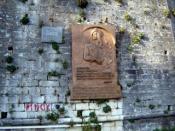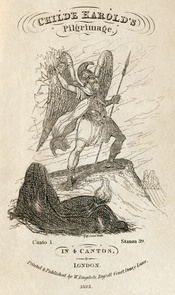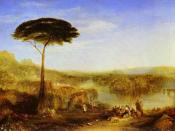Childe Harold's Pilgrimage
Childe Harold's Pilgrimage is a travelogue written by a melancholic, passionate and expressive tourist. Byron wrote this poem on his travels trough Spain, Portugal, Albania, Greece, Belgium, Switzerland, the Alps and Italy.
The hero of the poem, Childe (an ancient term for a young noble awaiting knighthood) Harold is a young extremely emotional man who turns away from the regular society and humanity and wanders through life caring the heavy guilt of mysterious vices of his past.
The poem reflects Lord Byron's views regarding nature and society.
In Byron's Childe Harold's Pilgrimage we find two opposing forces, one of which is highly idolized by Byron, while the second one is definitely less admired. On one side we are facing the glorious nature, the freedom, the joys of the wilderness and the power of the ocean, while the opposing side is represented by the society, man's humility, man's weakness, political and spiritual slavery, illusionary freedom and false love.
Byron worships the nature and constantly attempts to escape the madness of the society.
Byron was devoted to nature above all, as it is the only thing capable of bringing a man closer to God, eternity and understanding of the unknown. "To mingle with the Universe, and feel, what I can ne'er express, yet cannot all conceal", thus, nature is man's only way of roughly touching the mystifying beyond, the inexpressible, that colossal feeling of the grandeur of creation, which we can not express, yet the most emotional of us are at least able to feel.
Nature is our only link to the glorious power of life and universe. Our only way of understanding our selves, our souls and minds is through facing the nature.
Lines like: "Art, Glory, Freedom fail, but Nature still is fair", reflect Byron's belief that...


